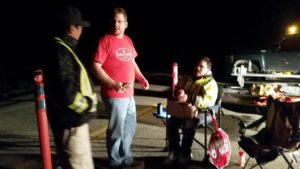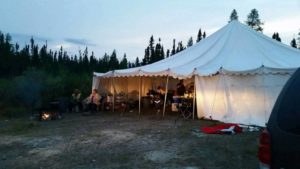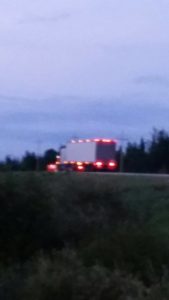Opaskwayak Cree Nation Trappers Association and Fisher’s Co-op staged a successful protest against Manitoba Hydro this past week, capping off nine years of stalled negotiations between land users and the crown corporation. The issue on the table for this whole time was the disruption to livelihoods for trappers and fishers, after Cedar Lake and the Grand Rapids dam flooded their traditional territory 50 years ago.
A peaceful blockade on Highway 6 near Ponton Station closed one lane of the highway, and protesters prevented any Manitoba Hydro freight from passing through. For personal vehicles and busses, the only inconvenience experienced would be a slow down not unlike a construction zone. But if the manifest on a truck indicated that parts were destined to Keeyask Generating Station or Keewatinohk, new hydro developments underway near Split Lake and north of Gillam, the drivers were instructed to turn around.

I wish that I could tell you I was making up the events that transpired during the protest, about some of the ways Manitoba Hydro and their subcontractors behaved during this past week. I think it’s important to give you a taste of the disrespect that Indigenous land users have been subject to since Manitoba Hydro first began pinching off our rivers, and to do so by sharing the perspective from one of the blockaders.
I spoke with an OCN fisherman’s wife, Beverly (her name has been changed to protect her from reprisals), about her experience on the front lines at this peaceful protest, her observations, her highs and lows, and how it felt to ‘knock the crown’ off Manitoba Hydro after the agreement to better compensation had been announced.
“I arrived on Thursday, and the protest had been going on since Monday. There was a kitchen camp set up and it was all quite organized. By this time, we’d been getting lots of support and everyone was helping out any way they could. Young and old, we had kids hauling firewood and food was being cooked. There were no bosses pushing their weight around, it was all very positive.”

“What struck me was how many elders were present. These were the people who were firsthand-directly affected by the dams when they first went up, and after all these years they are still fighting. We had a 78-year-old on dialysis…you can imagine how difficult that was to keep going out in the bush, but it was important for them all to be there.”
He had to get a job working at the dam, in fact. The dam that took away his ability to provide for his family, that’s where he works now digging holes
Beverly’s eagerness to participate in the blockade is understandable once she describes how it has affected her family personally. Her husband is a fisherman who could be making $50,000 in a season. Because of degradation of the environment due to hydro flooding, the returns have dwindled to $4000 a season. “He had to get a job working at the dam, in fact. The dam that took away his ability to provide for his family, that’s where he works now digging holes. He has a class one driver’s licence but they give him menial labour.”
Early into the protest, Manitoba Hydro told the CBC that it was OCN fishermen and trappers who walked away from the bargaining table after 9 years of talks. This is perhaps technically true, but as this story unfolds, it begins to read like a cold war thriller instead of a respectful dialogue. “After nine years, Hydro called the presidents [of the two groups] to Winnipeg for Friday for a meeting. Then they got word that the meeting had been moved to Monday. Then on Monday it was moved to Wednesday. So our presidents are sitting around in Winnipeg when they get a call that heavy turbines and other equipment that’s essential to Keeyask was spotted moving on the highways. Now I tell you, the threat of a blockade had already been served to Hydro, but that’s when we realized that hydro thought it had cut the head off the snake, so to speak, and marooned the presidents in Winnipeg where they couldn’t organize anything. They were jerking them around. That’s when the blockade began.”
that’s when we realized that hydro thought it had cut the head off the snake, so to speak, and marooned the presidents in Winnipeg
By the time Beverly had arrived on Thursday, the blockade was a smooth and safe operation that coalesced around the leadership of one man, Riley Lathin, who has a background in trucking. He brought his knowledge to the few who were permitted to be on the front lines: All licence plates of transport trucks that were permitted or denied were recorded. Manifests were checked for a Keeyask destination. Food and medical supplies were not to be delayed. The majority of protesters were well out of harm’s way in the camp, and only a core group of blockaders were present on the road. The RCMP and OCN Police were on site with flashing lights to slow down traffic. For the few unwise truckers that did barge through the blockade, the RCMP were quick to pounce on them and lay charges. News of the RCMP’s swift action sent shockwaves through the trucker’s networks.

It was because of their adept organization and training that they began to notice weird inconsistencies in the trucks and traffic passing them by. “I know what kinds of rules and regulations that truckers need to follow, what their manifests look like,” said Beverly. “I can easily spot a forgery, and it wasn’t long before I spotted fake manifests being produced by truckers.” These fake manifests were photocopies and made to look like the cargo was destined for Thompson’s mine. “What the drivers were doing was illegal. We told some of these drivers that we were going to report them to the department of highways and boy, they turned around so fast you’d think they saw a ghost! But when we told the RCMP, they simply didn’t believe us and wouldn’t investigate it. That’s when a trucker who had been delayed for three hours actually came to us and showed us the texts that his company (a hydro subcontractor) was sending him, urging him to fudge the manifest to get past the blockade. We showed the RCMP this text exchange and, well, let’s just say that they put a stop to that right quick.”
I can easily spot a forgery, and it wasn’t long before I spotted fake manifests being produced by truckers
“Hydro did everything, everything you can think of, to get past us. We had 14 U-Hauls come through the blockade from The Pas, pretending they were just people moving up north. We told them we knew what they were doing and took pictures of them.”
Meanwhile, the camp was gaining support not only from the community, but from the truckers themselves. A moose was delivered to camp, and women busied themselves preparing it for the group. Fresh picked berries, fish, flour, lard and other supplies were finding their way to the cookhouse. One couple from Split Lake brought $900 worth of groceries to the camp from Winnipeg, after passing through it on their way south. “When people did this, it just brought a real joy and positivity to the camp. To know that we were being supported and provided for, it was a great feeling.” Not even the truckers went hungry, and many were invited to come eat hearty camp meals with the elders, who shared stories with them about their plight. “I’d say that the majority of truckers that joined us to have a meal and sit around the fire left with a better understanding of what we are fighting for” said Beverly. “Many of the truckers who we halted were new immigrants, and didn’t know the issues. They were frightened that they were going to lose their jobs. Others were fellow Indigenous drivers who told us that we were hurting them by setting up this blockade. We knew that they were getting paid to sit on the side of the road anyway, and the RCMP signed extensions to their permits so that they weren’t becoming stuck. Hydro was the only one getting inconvenienced here.”
When I asked Beverly about the highs and lows she experienced at the blockade, she said they both occurred right at the very end of the protest. “Irvin Constant, President of the Fishing Association, James Sinclair, president of the Trappers association, and the mediator, John Morseau, were invited to Grand Rapids to speak to the president of Manitoba Hydro on a conference call. We were all tense because Hydro tried to pull a fast one on us last time our presidents were away, and they tried it again. The VP of Manitoba Hydro sent a text to numerous trucking companies, telling them that we had negotiated a deal. This was a lie, and as far as I’m concerned, this woman should be fired. We had suddenly a big influx of trucks trying to get through and tensions were rising. But we managed to get a message through to our presidents telling them what was happening, and that we weren’t letting anyone through, and they carried that message into the negotiations. Two hours later, they returned.”
What happened, I asked?
We had an agreement! The camp erupted with joy, I’ll tell ya. We were all crying, hugging one another
“We had an agreement! The camp erupted with joy, I’ll tell ya. We were all crying, hugging one another. We were so thankful…we honestly couldn’t believe it! We went to Ponton Station to tell the truckers that the blockade was lifted, out of respect for them. We stayed one more night in the camp and then cleaned up the following morning.
I asked Beverly to reflect on the protest, which she thinks is one of the best organized ones ever (although she might be biased). She had this to say about Manitoba Hydro’s behaviour, in contrast to their own, throughout this fight. “You know, it was terrible for me to see Manitoba Hydro and the subcontractors causing harm to their employees throughout this, and using them as pawns to break us up. They caused criminal charges to be laid against some drivers by urging them to change their manifest. They tried to break us at the end by saying that an agreement had been reached. You wouldn’t think that Hydro would do something like that, but they did.
“We stayed within the law the entire time. We have a right, in this country, to stage peaceful protest and to block roads. Until there is an injunction issued by a judge, that’s our right. We worked together as a team and with the RCMP to maintain safety and peacefulness throughout the entire thing. In all, 83 trucks were turned around. Honesty and integrity go a long way. Hydro worked outside the law and they didn’t win.”

